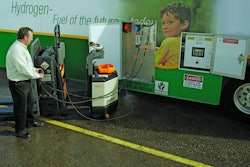As the acceptance and use of electric vehicles is becoming more prevalent, thanks to recent investment from the government and car manufactures, more commercial property owners and managers are grappling with how to react to growing demand for EV charging stations at their properties.
“The growth of the electric car sector is very real,” says Bob Best, SVP and head of Jones Lang LaSalle’s EV Task Force. “We know the eventual demand for charging stations is going to hit the real estate market, and we need to be prepared to guide owners on the best approach to tackling this issue.”
To help building managers navigate the emerging EV charging station arena, Jones Lang LaSalle, along with other EV industry leaders, has developed an educational program that offers managers guidance on everything from purchasing charging stations to installing and maintaining the technology.
Named the EZ EV program, it aims to address common concerns about charging stations, such as demand, price, logistics and return on investment. The program stemmed from an EV task force Jones Lang LaSalle formed in 2010 after receiving a plethora of questions from clients about the potential need for charging stations at their properties.
“Considering the recent substantial investment in electric cars, both from the government and car manufactures, I don’t think ignoring the EV movement and its potential opportunities is wise,” Best says.
In 2009, the Department of Energy awarded $2.4 billion in stimulus money to various entities to build electric vehicles and develop a charging station infrastructure, spurring the electric car’s growth.
In fact, the cumulative investment in national and regional charging station infrastructure is projected to reach between $5 billion and $10 billion by 2015, according to information from the Electric Drive Transportation Association (EDTA).
Further, an estimated 20 electric car models, including the Nissan Leaf and the Chevrolet Volt, are expected to hit the marketplace and roadways by 2012, according to the same information.
“More and more people are going to want to use these cars, so over time there will be more pressure on building owners and managers to provide charging stations,” says Brian Wynn, president of the EDTA. “We want them to know this is coming and to be ready for it.”
Developed in partnership with Eaton Corp., and WESCO Distribution Inc., the EZ EV program is intended to help prepare building managers for this potential investment.
It offers education about the actual charging stations, how to determine demand, the installation process, implementation and overall strategies for seamlessly integrating the devices into their properties. The education comes in the form of written materials, as well as a 1-800 number and e-mail address where property managers can direct their questions.
“This is a rapidly emerging area, so we wanted to make the information-gathering process and the ability to execute an EV strategy for building managers as easy as possible,” says Steve Johanns, area sales manager for Eaton, a power management company. “We’ll do everything from answer questions and help managers develop an appropriate bill of material, to discussing turn-key solutions, and even assist in identifying installation partners through the Eaton Certified Contractor Network.”
The more educated and proactive managers are about charging stations, the more they will be valued by owners who already have their own questions about such an investment and the potential returns and pitfalls.
“Property managers’ clients are asking questions and they need to have answers,” says Chuck Smith, global account manager for WESCO, an electric charging station distributor. “Having this information easily accessible will bring value to their customers and clients.”
Best said whether or not the charging stations are a necessary investment for buildings at this point remains unclear, but he said being able to respond to owners’ queries about the trend with informed answers is most important.
“We are groping our way into a vast unknown area,” Best says. “The electric cars are not here yet, so it’s not surprising that our clients are unsure about what to do. Our best response is exactly what we are doing...trying to stay informed and develop solutions to fit the emerging need as best we can.”



















